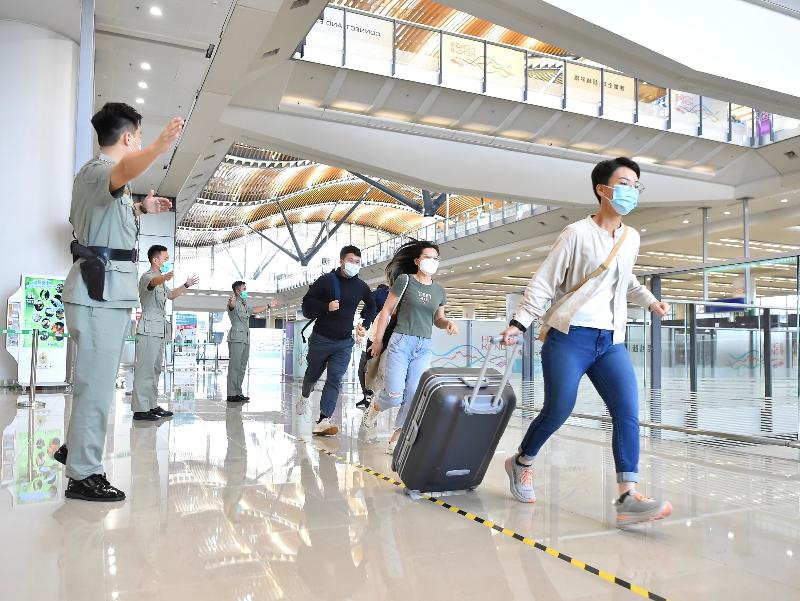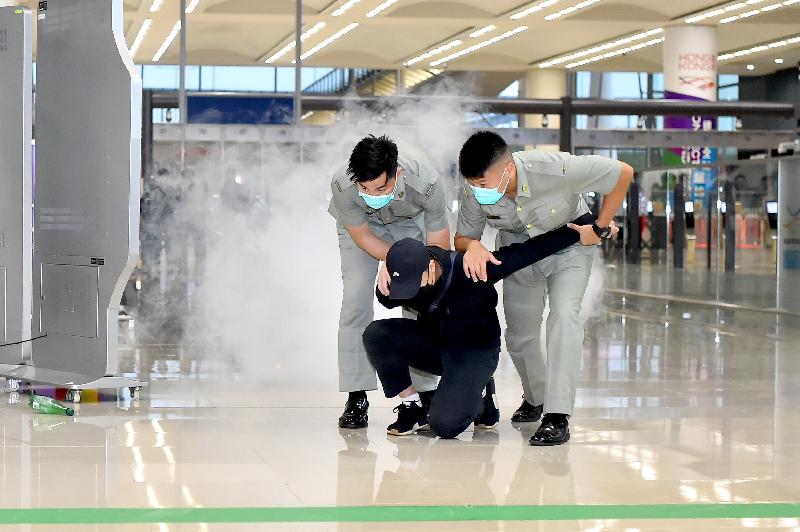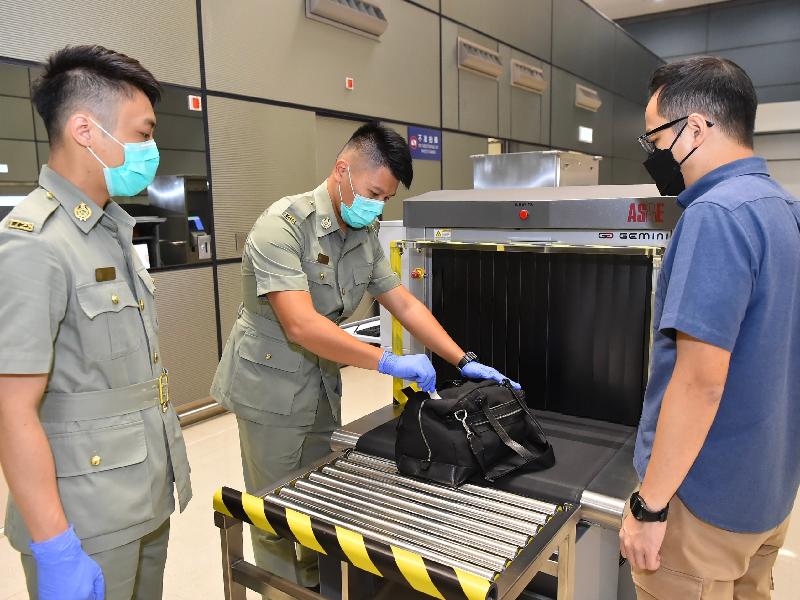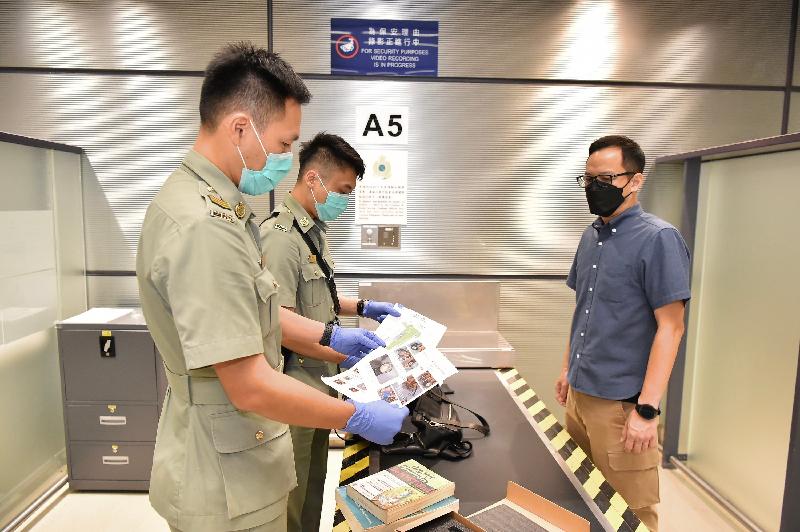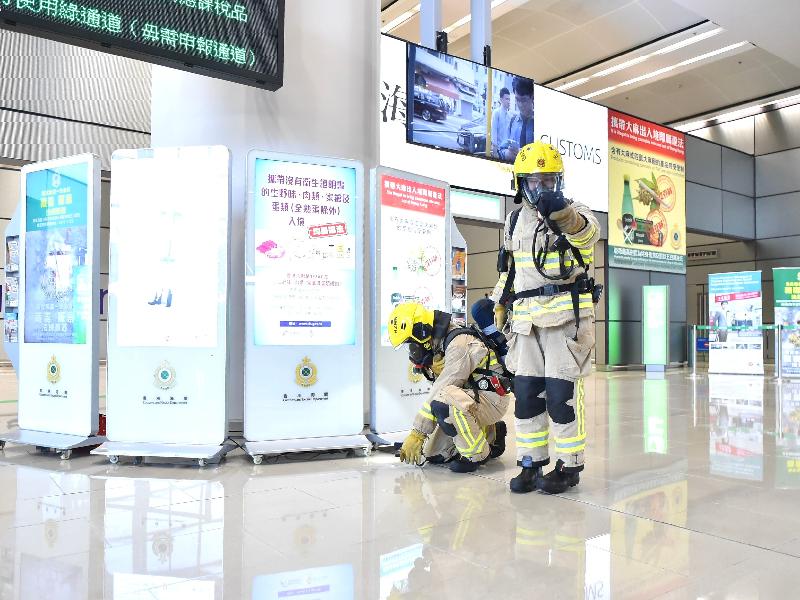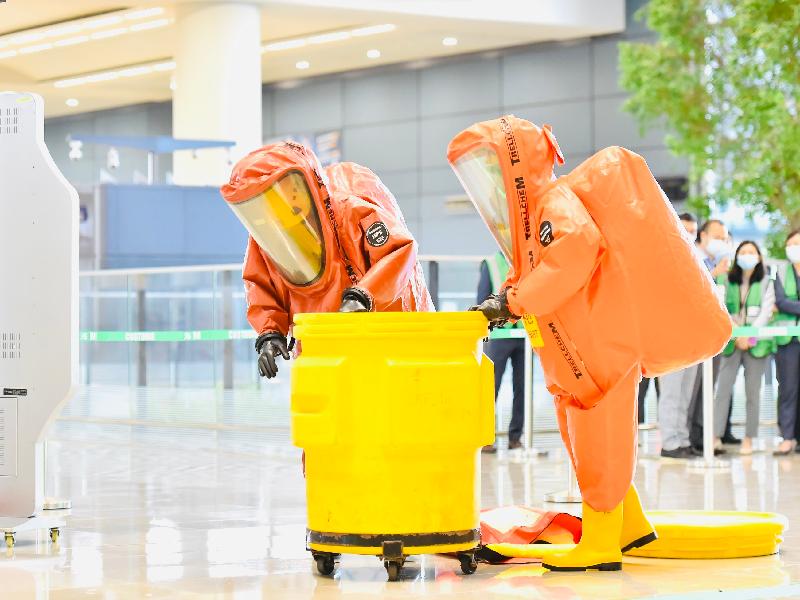Following is the speech by the Secretary for Justice, Ms Teresa Cheng, SC, at the Rule of Law Signature Engagement Event: "A Journey of Transformation for a Sustainable Future" under Hong Kong Legal Week 2021 today (November 5):
Chief Justice (Chief Justice of the Court of Final Appeal, Mr Andrew Cheung Kui-nung), Professor Dr Guo (Director General of the International Research Center of Big Data for Sustainable Development Goals, Professor Guo Huadong), distinguished guests, ladies and gentlemen,
On behalf of the Department of Justice, I extend our warmest welcome to our distinguished guests and speakers, to those joining today's event in person and, with the aid of technology, overseas speakers and participants that are able to join us virtually from all over the world.
Introduction
Today, we are here to celebrate three matters: the inaugural Rule of Law Signature Engagement Event, the launch of the Rule of Law Database, and the addition of LAWASIA to the Hong Kong Legal Hub.
Inaugural Rule of Law Signature Engagement Event
The inaugural Rule of Law Signature Engagement Event marks the last event of the Hong Kong Legal Week 2021. Being complementary to the Rule of Law Congress, with the events being held in alternating years during the Hong Kong Legal Week each year, this event aims to have a more in-depth discussion on selected topics involving specific stakeholders. The event title, Signature Engagement Event, with the acronym "SEE", is deliberately designed to tie in with the department's Vision 2030 for Rule of Law initiative – for us to "see" and focus on important topics for discussion, and advancing in the "vision" for Vision 2030 for Rule of Law towards a sustainable future for all.
The theme of today's event is "A Journey of Transformation for a Sustainable Future". Through today's discussions, covering a number of crucial topics including the development of legal technology, advancing access to justice and the importance of objective data, and how cultural, legal traditions and socio-economic factors interplay for the development of the rule of law, we invite you to join us in our journey and hope to enlighten your thoughts to share our vision in building and maintaining more equal and inclusive societies for a sustainable future in the region and beyond.
UN 2030 Agenda and big data
Vision 2030 was inspired by and aligns with the United Nations 2030 Agenda for Sustainable Development (UN 2030 Agenda), and in Goal 16 of the Agenda it aims to "promote peaceful and inclusive societies for sustainable development, provide access to justice for all and build effective, accountable and inclusive institutions at all levels". The rule of law is a key pillar to the implementation of the UN 2030 Agenda, and as identified by the United Nations Secretary-General António Guterres during the High-Level Political Forum on Sustainable Development in July 2021, "Invest in more equal and inclusive societies" is one of the four areas requiring decisive action (Note 1).
In his speech at the General Debate of the 75th session of the UN General Assembly last year, President Xi Jinping pledged for the establishment of the International Research Center of Big Data for Sustainable Development Goals, the first international scientific research institute in the world that serves the UN 2030 Agenda through big data (Note 2). Accordingly, the Research Center, operated by the Chinese Academy of Sciences, was inaugurated at the International Forum on Big Data for Sustainable Development Goals in September this year.
In his congratulatory letter at the inauguration ceremony, President Xi stressed the importance of using technology and big data in helping the international community to overcome difficulties and implement the UN 2030 Agenda globally, and to contribute to building a community with a sustainable future, especially after the huge impact of COVID-19 (Note 3). We are very honoured to have the Director General of the Research Center, Professor Dr Guo Huadong, deliver today's keynote speech on the topic "Big Earth Data in Facilitating of Sustainable Development Goals", taking us through the challenges and constraints in the implementation of the Sustainable Development Goals and how big data solutions can improve, monitor and evaluate these Goals.
Launch of Rule of Law Database
The rule of law manifests itself in a multitude of facets. I said in the Ceremonial Opening of the Legal Year 2020, "There are many intimations of what constitutes the rule of law – some may be described as perpetual truths and inspirational whilst others imaginative or even misleading. There are many ways by which the practice of rule of law is to be assessed, some based on subjective perception while others on objective indicia." Subjective data such as perception-based surveys may not accurately provide a fair picture of the practice of the rule of law in a particular place. As such, in order to develop a mechanism to review the practice of the rule of law, it may be more productive to use empirical and objective data to review the practice of some core fundamental in the practice of the rule of law.
The United Nations noted that the follow-up and review of the implementation of the 2030 Agenda for Sustainable Development shall be guided by, among other things, data "based on evidence, informed by country-led evaluations and data which is high-quality, timely, reliable and disaggregated by income, sex, age, race, ethnicity, migration status, disability and geographic location and other characteristics relevant in national contexts" (Note 4).
With the invaluable advice and guidance from the Members of the Task Force of Vision 2030 for Rule of Law, and in line with the UN 2030 Agenda, we have embarked on a journey to study the use of objective data in reviewing the practice of the rule of law as well as acknowledging the influence of culture, legal tradition and socio-economic conditions that may impact on the practice of the rule of law in different jurisdictions.
Rule of Law Database
I am delighted to share with you the good news that we have taken the first step forward to launch the rule of law database, which aims to provide an objective assessment of the practice of the rule of law in Hong Kong. Its features can be summarised into three aspects:
(i) Collection of objective data from open source
The objective data used in the database are collected from the public domain. However, raw data needs to be properly processed, analysed, interpreted and formatted before meaningful conclusions can be drawn. One must therefore avoid simply referring to the raw data as a direct reference to the practice of the rule of law in Hong Kong. Without proper analysis and interpretation, they may obfuscate as opposed to illuminate.
(ii) Methodologies subject to refinement
In order to assess the practice of the rule of law in an impartial and fair manner, methodologies have to be developed and continuously refined to effectively analyse the collected data. These methodologies will enable us to review the practice of the rule of law fairly. In updating and further refining these methodologies, any informed and objective views are most welcome.
(iii) Self-monitoring and striving for improvement
At this stage, all the objective data collected and analysed are intended to enable one to review the practice of the rule of law in Hong Kong, with a view to striving for continuous improvement. In the long run, with sufficient data, more focused and specialised analysis on the data based on a methodology with appropriate weighting or such other mathematical formulae can be conducted to study the practice of rule of law in Hong Kong, thereby facilitating self-improvement. This is in line with Target 16.3 of Goal 16 of UN 2030 Agenda for Sustainable Development, and that is to "Promote the rule of law at the national and international levels and ensure equal access to justice for all" (Note 5).
Culture and youth
Further to the successful launch of the Vision 2030 initiative last year, the Department of Justice has spared no efforts in working on various projects to promote and advance the rule of law. For more effective promotion and capacity building, the "3Es" projects, namely "Engagement", "Empowerment" and "Enrichment", have commenced to take root in society.
The Department of Justice also organised the International Youth Legal Exchange Conference 2021 (Note 6) (Youth Conference) in September this year as one of our "Enrichment" projects to explore how culture and legal tradition may influence the practice of the rule of law in different jurisdictions. Connecting the regional students and young legal practitioners in the Asia-Pacific region from 11 jurisdictions, views and ideas were exchanged on the cultural, socio-economic and legal traditions of their respective jurisdictions and how those elements interplay with the development of the rule of law.
As a follow-up to the Youth Conference I have just mentioned, we have invited members of the adjudicating panel and the delegates awarded the Best Paper, the University of Malaya, and the delegates awarded the Best Presentation, the National University of Singapore, for a more in-depth discussion of some of the cultural elements unique to their jurisdictions in the First Roundtable Dialogue Session.
We hope to provide more opportunities for the young generation to participate in international conferences, and, subject to feedback from stakeholders including from all of you here, we may seek to include a youth-centric event in later editions of the Hong Kong Legal Week every year in line with our aim of building a sustainable future for the rule of law.
Legal technology
Technological developments in the law and legal practice may impact on how law students should prepare for their future careers in this age of digital transformation. As lawyers, we are not experts in the fields of science or technology. This is where we bring in scientists and experts in these areas to collaborate and make use of the digital transformation to enhance the legal industry. Questions such as how judges can make use of technology in their courtrooms and how legal practitioners can make use of technology such as online dispute resolution (ODR) platforms in resolving cross-border disputes will undoubtedly be asked, in particular against the backdrop of ensuring that justice is not denied during the pandemic. Another intriguing question relates to the use of electronic means such as e-discovery to assist lawyers in achieving clarity, speed and efficiency in managing voluminous documents, assisting in their fight for the best interests of clients. We will hear from the distinguished panellists on these issues in the panel discussion later this afternoon.
The Department of Justice has long recognised the impact of legal technology. To this end the Inclusive Global Legal Innovation Platform on ODR, iGLIP on ODR, was set up to facilitate studies on ODR-related issues in collaboration with UNCITRAL, the United Nations Commission on International Trade Law, holding its first meeting in March this year and bringing together experts from all around the world to exchange views. Recently, the UNCITRAL Commission at its 54th Session in July endorsed its Secretariat's suggestion to continue to collaborate with Hong Kong on this area and to take part in iGLIP on ODR.
The development of the Hong Kong Legal Cloud is also well under way with a view to providing safe, secure and affordable data storage services for the local legal and dispute resolution sector to keep pace with the digital transformation.
Legal Hub
The third matter that calls for celebration today is the new addition of LAWASIA to the Legal Hub. Building on the success of the 32nd LAWASIA Conference in Hong Kong during the first Hong Kong Legal Week held in 2019, an agreement was reached between the Department of Justice and LAWASIA in October this year to strengthen co-operation and exchange.
This arrangement would allow LAWASIA to expand their influence in Hong Kong and the region by having a presence in the Hong Kong Legal Hub, and the Department of Justice will assist to facilitate the organisation of training, conferences or other events of LAWASIA that are of mutual interest in Hong Kong.
Our arrangement with LAWASIA is the first of its kind. To continue to develop Hong Kong as an international legal and dispute resolution services hub, the Department of Justice will continue to explore the possibility of bringing other renowned international organisations to Hong Kong.
Conclusion
Ladies and gentlemen, the UN 2030 Agenda seeks to transform the world, and throughout the course of this week, I hope that you can see that the Department of Justice is also committed to embarking on this collective journey by engaging, empowering, and enriching our stakeholders, striving to achieve our ultimate aim of "Rule of Law and Justice for All". Thank you.
Note 1: www.un.org/sg/en/content/sg/statement/2021-07-13/secretary-generals-remarks-the-opening-of-the-ministerial-segment-of-the-high-level-political-forum-sustainable-development-delivered
Note 2: www.digitalearth-isde.org/show-48-178-1.html
Note 3: www.gov.cn/xinwen/2021-09/06/content_5635631.htm
Note 4: www.un.org/ga/search/view_doc.asp?symbol=A/RES/70/1&Lang=E, see paragraph 74(g) at page 32
Note 5: sdgs.un.org/goals/goal16
Note 6: www.iylec2021.hk
